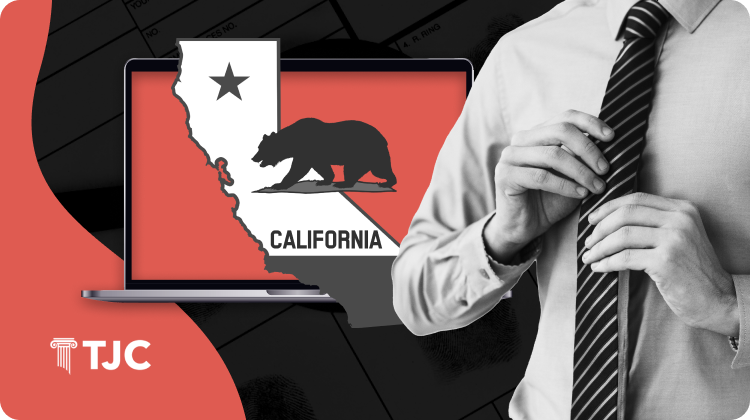California Fair Chance Act: Law For Employers & Job Applicants

The California Fair Chance Act aims to create a fairer hiring process by providing clear guidelines on background checks for employment and how to consider an applicant’s criminal history. Recent updates to the law offer even clearer instructions, ensuring everyone has an equal employment opportunity.
This law helps employers avoid discrimination based on criminal history and ensures all applicants are assessed fairly based on their qualifications and abilities. By following these guidelines, employers can create a more inclusive and equitable hiring process.
Additionally, the act requires employers to delay inquiries into an applicant’s criminal history until after a conditional job offer is made. This ensures that an applicant’s employment history, qualifications, and abilities are the main focus in the initial hiring stages, promoting fairness and reducing bias.
What is the Fair Chance Act
The Fair Chance Act aims to reduce job barriers for people with criminal records. Also known as “Ban the Box,” it prohibits employers with five or more employees from asking about an applicant’s criminal history until after a job offer is made. This federal law is part of the Fair Employment and Housing Act (FEHA) and is enforced by the Civil Rights Department (CRD).
Why Was the Fair Chance Act Implemented?
The main aim of the Fair Chance Act is to promote employment opportunities for individuals with criminal histories. Having a job is a necessity for these individuals to support themselves and their families, improve community ties, and enhance mental health. By facilitating fair access to employment, the law helps reduce employment discrimination, thereby benefiting society as a whole.
Key Points of the Fair Chance Act
Prohibition Before Conditional Offers:
- Employers cannot ask about criminal history on job applications.
- Employers are prohibited from considering an applicant’s criminal history before extending a conditional job offer.
Post-Offer Criminal History Check:
- Employers can conduct a criminal history check after making a conditional job offer.
- Employers must carefully review an individual’s criminal history before deciding to withdraw a job offer. They consider the type and severity of the offense, how much time has passed since it occurred, and whether it relates to the job in question.
Notification and Response Process:
- If the job offer is withdrawn due to criminal history, employers must inform the applicant.
- A copy of the criminal history report used must be provided to the applicant.
- Applicants are given at least five business days to respond, offering corrections or explanations regarding their criminal history.
How the Law Works
For Employers:
Employers need to adjust their hiring practices to comply with the Fair Chance Act:
- Application Forms: Remove any questions about criminal history from job applications.
- Conditional Job Offers: Only after making a conditional job offer can employers inquire about criminal history.
- Individualized Assessment: Employers must perform an individualized assessment if they consider withdrawing a job offer due to criminal history. This assessment must consider the severity of the offense, the time since the conviction, and the relevance of the offense to the job.
If an employer decides to withdraw a job offer, they must:
- Provide written notification to the applicant.
- Give a copy of the criminal history report used.
- Allow the applicant at least five business days to respond.
For Job Applicants:
The Fair Chance Act benefits job applicants by ensuring a fair evaluation process based on their qualifications rather than their past:
- Fair Evaluation: Applicants are judged on their skills and experience before their criminal history is considered.
- Opportunity to Respond: If their criminal history is considered, applicants have the opportunity to explain their circumstances and provide additional information.
Which Employers are Covered by the Law
The Fair Chance Act applies to a wide range of employers:
- Public and Private Employers: Any employer with five or more employees, may it be in public or private, must adhere to the law.
- Union Hiring Halls and Labor Contractors: These organizations must comply with the Fair Chance Act.
- Temporary Employment Agencies and Client Employers: Entities utilizing temporary workers must ensure compliance with the law.
Exemptions
Certain positions and employers are exempt from the Fair Chance Act:
- Healthcare Positions: Some roles in healthcare facilities are not covered.
- Farm Labor Contractors: Specific positions related to farm labor contracting may be exempt.
- State Criminal Justice Agencies: Jobs within state criminal justice agencies are excluded.
- Legally Required Background Checks: Employers are exempt when other laws mandate background checks or restrict employment based on criminal history for specific positions.
Take Note: Even for exempt positions, using criminal history must not be discriminatory. Employers must prove that considering criminal history is job-related and necessary for business.
California Fair Chance Act: New Regulations
The revised Fair Chance Act regulations bring several changes to how criminal history information can be considered in employment decisions, including updated definitions and prohibitions.
- Employer: The definition of “employer” has been broadened significantly. It now includes not just labor contractors and client employers, but also direct or joint employers, entities that assess an applicant’s conviction history for an employer, staffing agencies, and organizations that provide workers from a pool or availability list.
- Applicant: The definition of “applicant” has been expanded to include two new groups: 1) current employees who have applied for or shown interest in another position within their current organization, and 2) current employees who are undergoing a criminal history review due to changes in ownership, management, policy, or procedures.
Employers must not include statements in job ads, postings, applications, or other materials that discriminate against applicants based on their criminal history. Exceptions to these rules do not apply when another entity, like an occupational licensing board, is legally required to conduct the background check.
Even if an applicant voluntarily discloses their criminal history before a conditional offer, the employer is not permitted to consider this information.
Conditional Offer Process
The regulations specify a process that must be followed if an employer plans to withdraw a conditional job offer due to an applicant’s conviction history.
- Initial Individualized Assessment: Employers must consider the seriousness of the offense, how much time has passed since it happened, and how it relates to the job. They should also look at any evidence of rehabilitation or other factors the applicant provides.
- Notice of Preliminary Decision: If the employer decides that the applicant’s criminal record might disqualify them, they must inform the applicant in writing and allow them a chance to respond. The applicant can voluntarily offer evidence of rehabilitation or other factors, which the employer must consider.
- Reassessment: After receiving the applicant’s response, the employer must reassess the situation. This includes considering any additional evidence of rehabilitation, the applicant’s conduct during incarceration, employment history since the conviction, community service, and other mitigating factors.
FEHA Procedures
The Fair Employment and Housing Act (FEHA) procedures apply to claims under the Fair Chance Act. This means that applicants and employees can file complaints with the California Civil Rights Department (CRD) and may obtain an immediate right-to-sue notice. Employers must ensure compliance with these procedures to avoid potential litigation.
Work Opportunity Tax Credit
Employers seeking the federal Work Opportunity Tax Credit (WOTC) must follow specific procedures:
- IRS Form 8850: Employers can request applicants complete this form before extending a conditional job offer but cannot inquire about the specific qualifying basis for the WOTC.
- Form 9061: This form can only be completed after a conditional job offer is made. All information related to the WOTC application must be kept confidential and separate from the general personnel file.
Modifications Summary
Employer
- The definition now includes joint employers, staffing agencies, etc.
- It’s prohibited to exclude applicants with criminal history in job ads.
- A specific assessment and reassessment process is required before withdrawing a conditional offer.
- Complaints and potential litigation must follow FEHA procedures.
- WOTC applications and information must be handled confidentially and separately.
Applicant
- Includes current employees applying for different positions and those under review due to management or policy changes.
- Can voluntarily offer evidence of rehabilitation and mitigating circumstances at any stage.
- Given a chance to respond to initial decisions.
- Can lodge complaints with the California Civil Rights Department (CRD).
What California Employers Should Do Now
Given the recent modifications to the Fair Chance Act, California employers need to take specific actions to ensure compliance:
- Review and Update Definitions: Employers must determine if they fall under the expanded definition of “employer” and update their policies accordingly. This includes joint employers, staffing agencies, and any entity evaluating an applicant’s conviction history.
- Revise Job Advertisements and Applications: Ensure that job ads and applications do not contain statements that exclude applicants based on criminal histories.
- Train Employees: Educate all relevant staff, especially those in management and human resources, on the new procedures and requirements.
- Follow Proper Procedures: Adhere to the individualized assessment process and allow applicants the opportunity to respond before withdrawing a conditional job offer.
- Handle WOTC Applications Appropriately: Manage WOTC applications and related information confidentially and separately from other personnel records.
- Monitor Legislative Changes: Stay updated on potential future changes, such as Senate Bill 809, which may introduce additional restrictions on conducting background checks.
What California Job Applicants Should Do Now
Job seekers in California should understand their rights and the steps they can take under the revised Fair Chance Act:
- Understand Your Rights: Be aware that employers cannot ask about your criminal history before making a conditional job offer.
- Provide Relevant Evidence: Employers cannot inquire about your criminal history until after a conditional job offer is made.
- Respond to Preliminary Decisions: If an employer decides that your conviction history disqualifies you for the job position, you can offer evidence of rehabilitation or other factors to support your application.
- File Complaints If Necessary: If you suspect an employer has violated the Fair Chance Act, you can file a complaint with the California Civil Rights Department (CRD) and pursue legal action if necessary.
- Leverage Your Employment History: Emphasize your work history and positive developments since your conviction to strengthen your case during the assessment process.
Final Considerations on California Fair Chance Act
The California Fair Chance Act promotes fair hiring by prohibiting employers from asking about an applicant’s criminal history before making a conditional job offer. It expands definitions for “employer” and “applicant” and mandates a comprehensive review of criminal history only after an offer is made.
Employers must follow specific procedures if they plan to withdraw a job offer due to criminal history. This includes providing written notice and giving applicants a chance to demonstrate rehabilitation or mitigating circumstances. These measures ensure fair assessment and help reintegrate individuals with criminal records into society while reducing repeat offenses.
The Fair Chance Act aims to create a more inclusive and equitable job market for all Californians when it comes to local background checks.



